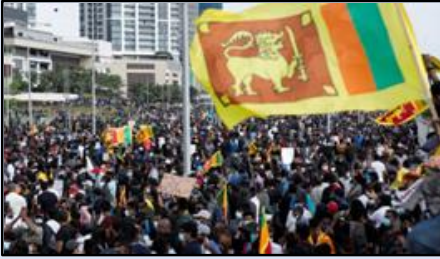Sri Lanka: an awakening? The country is facing an unprecedented crisis, but also an unprecedented opportunity – By Sanjayan Rajasingham

Source : Confluence – South Asian Perspectives – May – August 2022 issue
First, the crisis. At its simplest, Sri Lanka lacks the money it needs to buy the things it needs. A few big reasons: structurally, Sri Lanka has had a debt-driven growth strategy, but a lot of its expenditure of that debt was on low-return investments. This worked when Sri Lanka could access loans at concessionary rates, but became a problem when it reached middle income status and had to borrow at commercial rates. Second, Sri Lanka has a problem of low government revenue, exacerbated by President Gotabaya Rajapaksa’s decision, in 2019, to introduce a tax cut in anticipation of a Parliamentary election – a tax cut that reduced government revenue by as much as 25%. Low revenue and high debt interest repayments made for a perfect storm, and President Rajapaksa then decided, in
April 2021, to introduce an overnight ban on chemical fertiliser. This had a significant impact on Sri Lanka’s agricultural output, and meant a loss of foreign exchange through a fall in cash crop earnings, and through more
money spent on importing rice. COVID-19 and Russia’s invasion of Ukraine were the final straws. They reduced income from tourism and increased prices.
The result is acute, widespread economic pain – and an economy on the verge of collapse. Gas and petrol are in short supply – people queue hours to get them, and the government doesn’t have the money to buy them. Power cuts are at three and a half hours a day and will increase. Medicines are running out. Soon, food items may as well.
Yet the crisis has also led to an opportunity: a remarkable awakening, seen in protests by citizens that are unprecedented in their breadth and depth. Sri Lankans across almost every dividing line have come together, sometimes in their tens of thousands, to demand the removal of Mr Rajapaksa and his family – four of whom held prominent positions, including the posts of Finance Minister and Prime Minister, until recently. From fisherfolk, to garment workers, to university professors, to healthcare workers, to everyday citizens – the call for the Rajapaksas to go, to be held accountable, and for a change to the system, has been resounding.
Particularly striking is the permanent protest site set up at the seafront promenade, Galle Face, just opposite the
President’s office in Colombo. The protestors call it ‘GotaGoGama’ (gama means ‘village’ in Sinhalese). GGG, as it is
now known, has grown beyond all recognition. Lawyers have set up a legal aid clinic. Citizens have opened up a library.
There are regular impromptu speeches, drama and songs targeting a failed political system. Some started a ‘People’s
University’, with regular talks to fuel a nascent civic awakening. By all accounts, GGG is a remarkable space. Women as well as men lead discussions and protests. Marginalised groups, whether Muslims, Tamils, LGBT persons, or working-class individuals – all have an opportunity to speak and be heard. For some, GGG is not a protest seeking a solution – it is a solution, a lived community demonstrating what a different Sri Lanka can look like.
Where will Sri Lanka go next? This depends on three things: the fate of the Rajapaksas; the role of the military; and the evolution of protests.
First, will Gotabaya go? For now, he seems to be digging his heels in. His brother Mahinda Rajapaksa was Prime Minister until the 9th of May, but his involvement in setting a group of thugs on protesters at GGG, led to retaliatory rioting and attacks on government MPs and their property, and the murder of one MP. This forced him
to resign. The president then appointed five-time prime minister Ranil Wickremesinghe to the post. Mr. Wickremesinghe lacks legitimacy – he lost his own constituency in the last election and got into Parliament on a bonus seat. In his first speech, he painted a bleak picture and made it clear that things would get worse before they got better. But will there be real change? And was his appointment in exchange for a promise to protect the
Rajapaksas? Both remain to be seen, but as if in answer to the latter, the new Prime Minister blocked a motion by the
Opposition to censure the President in Parliament this week. And if Mr. Wickremesinghe does not deliver, Sri Lanka’s instability will only get worse.
The risk of instability has stoked fears around a second key variable: the military. For some time now, there have been fears that an economic collapse will be used by either President Rajapaksa or by the military itself to launch a coup. From the start of his tenure in 2019, President Rajapaksa promoted the military as the most efficient and disciplined institution in the country. He made sure that serving or ex- military officers became ministry
secretaries. In the north and the east, the armed forces police the public, cultivate land and operate hotels. After the chemical fertilizer fiasco, President Rajapaksa promised that the army would ‘help’ farmers implement his misguided policy. When the military is made to appear ‘the best institution for the job’, and the people lose faith in the political system, it is easy for them to turn to the military for solutions. This is what happened in Thailand and Myanmar. Sri Lanka might yet go down that dark path.
In the midst of all this, a final question: will these protests lead to a genuine civic awakening? It still could. Up to now, GGG, for all its creativity and potential, had done little to challenge some of the Sri Lanka’s fundamental problems: a Sinhala-Buddhist extremist nationalism that sees the country as belonging to the Sinhalese Buddhists, with all others as guests; Buddhism’s place in a multi-religious country; and a serious reflection on the root causes of Sri Lanka’s civil war and class conflict. This may be why most people in the North and East – mostly Tamils, as well as Muslims – stayed aloof. They feel a deep cynicism, borne of the failure of the south to protest on behalf of
Tamils when they suffered far worse economic deprivation and state violence during the civil war. This may be a shortsighted stance by the Tamils, a failure to recognise justice claims that are not their own – but in the context, it is an understandable one.
Yet there are reasons for hope. Sri Lanka’s civil war between the government and the Liberation Tigers of Tamil Eelam (LTTE) ended on the 18th of May 2009, in a bloody final push that saw thousands of civilians killed because of the actions of both sides. While the Rajapaksas, who drove that military campaign, have insisted on celebrating the 18th as ‘Victory Day’, most Tamils see it as a day of mourning. This year, in an unprecedented move, there was
an event of mourning and memorialization held at GGG, just opposite the President’s office. A willingness to see the end of the war differently by some Sinhalese is a big step. Could this be the beginning of something more? Could Sri Lanka’s crisis lead to a generation of Sri Lankans of all backgrounds who are willing to interrogate the deeper divisions and fault lines in Sri Lankan society?
The future of Sri Lanka is unclear, and things are unlikely to get better any time soon. However, history, it is said, does not move in a straight line, but zigs and zags. Perhaps, then, Sri Lanka still has an opportunity in the midst of this crisis.
 Sanjayan Rajasingham is a visiting researcher at Thammasat University, Thailand and a doctoral student at Yale Law School, USA. He was formerly a lecturer in law at the University of Jaffna. His dissertation looks at constitutional law in Buddhist-majority states, with a focus on Sri Lanka and Thailand.
Sanjayan Rajasingham is a visiting researcher at Thammasat University, Thailand and a doctoral student at Yale Law School, USA. He was formerly a lecturer in law at the University of Jaffna. His dissertation looks at constitutional law in Buddhist-majority states, with a focus on Sri Lanka and Thailand.
Editor’s note: Since this article was written there has been some progress in the political situation as Rajapaksa family have been removed from power and the former President has fled the country. An interim administration is in charge for now. However, the country’s worsening economic situation is still threatening the country’s stability.







